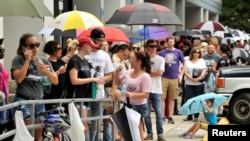Members of the gay community in the U.S. are calling for the lifting of a federal ban on blood donations by men who have sex with men.
After this week's shooting at a gay nightclub in Orlando, Florida, thousands of homosexuals lined up to donate blood to survivors. However, they were turned away because of U.S. government rules that prohibit gay men from giving blood if they have been sexually active within the past year.
In the wake of the shootings, the policy is causing anger and outrage among gays.
The policy was put in place in the 1980s during the AIDS epidemic, and it barred gay and bisexual men from donating blood out of fear that they were at high risk of being HIV-positive and could contaminate the blood supply.
Last year, the U.S. Food and Drug Administration revised the policy, allowing contributions provided the gay men had been celibate for one year.
Scientific developments
Public health advocates, who argued for lifting the blood donation ban last year, say the policy does not keep pace with some recent scientific developments to safeguard the blood supply against HIV.
Sean Cahill, director of health policy research at the Fenway Institute in Boston, said the revised policy is still unfair. The Fenway Institute does public health advocacy on behalf of the LGBT community.
According to Cahill, the so-called nucleic acid test is now available to detect the presence of HIV in a pint of blood in less than two weeks, compared with the months it used to take. The test is performed on all blood samples to make sure they don't contain the virus.
Cahill said the second development involves a method of destroying most pathogens in blood, be they bacteria or viruses, including the AIDS virus.
"Even if somehow an HIV-positive unit of blood gets through the systems that are in place, this pathogen inactivation technology could destroy the HIV in that unit of blood," Cahill said.
Cahill said the one-year ban doesn't allow for those males who are in monogamous relationships or who are happily married and are HIV-negative.
People in other high-risk groups are not barred from giving blood, according to Cahill. These individuals include those who have intercourse with sex workers, or intravenous drug abusers who may be donating blood in exchange for money to buy drugs.
Call for updated policy
Cahill called for a more refined blood donation policy.
"We would really like to see a policy that ... distinguishes between high-risk gay and bisexual men and low-risk gay and bisexual men, and actually looks at individual risk as opposed to looking at people as members of groups."
Cahill noted that 15 percent of gay men are HIV-positive in the U.S., but the FDA ban excludes the remaining 85 percent of gay men who would be suitable and safe blood donors.
Cahill said the supply of banked blood nationwide would increase by 2 to 4 percent by lifting the one-year ban on blood donations by gay and bisexual men. He also said the move would ease the social stigma felt by U.S. gays.




